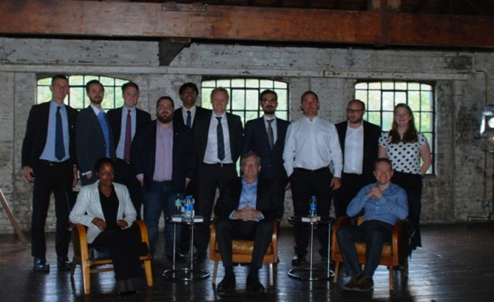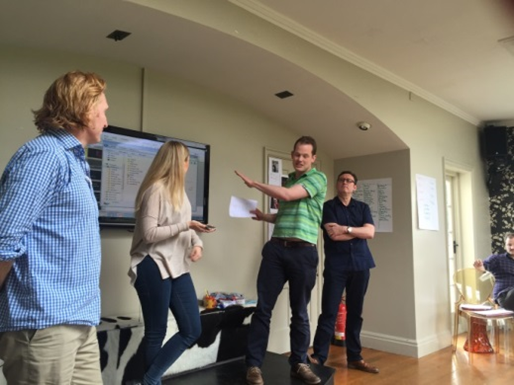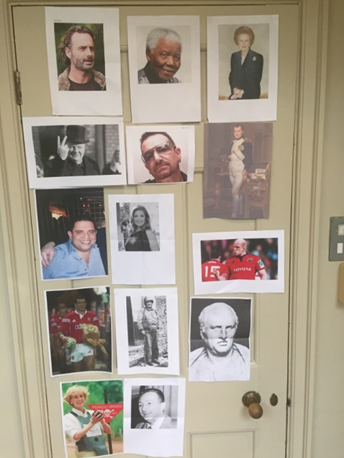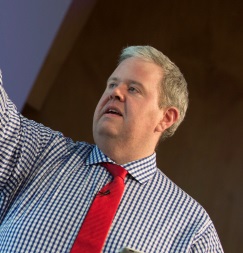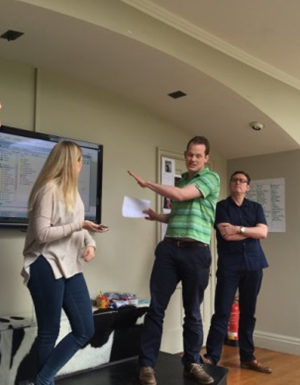
Crossrail Leadership Development Programme
Document
type: Micro-report
Author:
Rob Jones
Publication
Date: 27/09/2016
-
Abstract
This micro report provides an overview of Crossrail’s approach to leadership development. The micro report concludes: the importance of ensuring targeting invitation to participate in the programme; establishing clear rules for engagement; facilitator consistency; and make a recommendation to future projects to consider including integrated partners in leadership development programmes.
This micro report will be of interest to individuals who seek to establish and deliver a leadership development programme in their organisation such as senior leadership team; organisational development practitioners; and learning and development specialists. -
Read the full document
Introduction & Context
Crossrail formed an integrated client delivery organisation in 2011 which brought together staff from Crossrail Limited, the Programme Delivery Partner and the Project Partner into one single, aligned team. The challenge from the CEO was to create “more than just a railway”. It was recognised there was a need and an opportunity to give leaders across the organisation an opportunity to focus on further developing their leadership.
Given the capabilities and effective development processes of Crossrail’s partners, it was decided to focus on those employed by Crossrail Limited to ensure they were given similar to support to those working for more traditional perpetual organisations.
In setting out to develop and implement a Leadership Development Programme for Crossrail Limited Staff, Crossrail had three clear objectives:
- Improve Crossrail’s capacity and capability to deliver the programme
- Improve organisational resilience by having a cohort of capable leaders ready to step-up or take on additional responsibilities
- Improve retention of Crossrail Limited staff by providing them with a quality development opportunity which they could apply to their day-to-day work on the programme
Selection
The initial selection process for the first groups started just over a year after the organisational change to form the integrated team. Although options were considered, including development centres and a formal application process, it was considered that given the progress being made in forming an aligned culture that the risk of disrupting that process was high.
Therefore, selection for the support, corporate and technical functions was by senior management nomination and the delivery function utilised a ‘People Day’, Crossrail’s process for people and talent management. (see Talent & Succession micro-report for further information). This format ensured visibility and advocacy across the geographically distributed teams.
Concept
The central idea underlying the programme was that improved self awareness and self knowledge would equip individuals to be more effective leaders. The communicated concept was that “if you understand yourself, your impact on other people and their impact on you” it would empower the individual to be more confident, capable and an effective leader.
Therefore, the focus was not on knowledge acquisition (of management or organisation theory) or functional/technical improvement which was seen as being supported through individual personal development planning (see Learning & Development micro-report for further information) but on creating an environment and content that could provoke participants improving their self knowledge.
Figure 1 – One of the Dragon’s Den with Programme Director, Talent & Resources Director &External Affairs Director taking on Dragon’s duties
Structure
The programme, which was was first delivered in 2013, was delivered in a modular format with 10 days of structured workshops over a 12 to 15-month period at 2 levels. The 2 levels were labelled ‘The Emerging Leader Programme’, targeted at middle managers, and ‘The Advanced Leader Programme’, targeted at senior managers to reflect those who were at different stages in refining their own leadership and putting them with appropriate colleagues to ensure support and challenge.
The groups were organised into cohorts of 12 to 15 with those groups further divided into Action Learning Sets (ALS). The focus was at ALS cohesion whilst the overall cohort became a cohesive unit. The ALSs were encouraged to meet between sessions and were given material to prompt discussion and reflection.
Figure 2 – One ALS trying to convince the rest of their cohort their plan is better!
Approach
The conscious choice we made in delivering the programme was that it was going to be facilitative rather than focussing on instruction with the facilitators accountable for creating a psychologically secure environment that gave the participants the comfort to be open and challenging.
At the same time it was made clear to the participants that they would “get out what they put in” and that whilst the organisation was pleased to support their development the opportunity to land what they learned was for them. Only through self motivation and application was the programme going to lead to further opportunity.
From a logistics perspective everything was hosted offsite to give people the physical and mental disconnection from their day to day tasks in appropriate venues to deliver the programme
Content
The modules delivered were as follows:
- Teams (2 days) – a launch event with a day long team exercise in London with either a live version of Monopoly or a Sherlock Holmes themed challenge, followed by reflection, discussion and appreciation of their performance in the context of some high performing team models
- Self Awareness (1 day) – a workshop using various tools to provoke the participants to learn about themselves and giving them some structure such as Myers-Briggs Type Indicator, to give context to themselves and their interactions with others
- Leadership (2.5 days) – a residential workshop which blends tasks and simulation with theory and case study to provoke a reflection on leadership in the context of broader stimulation, an opportunity (and challenge) to get and give powerful feedback
- Community (2 days) [Emerging Leaders only] – a 2 day event briefed in advance where all cohorts at that level came together to deliver an event aligned to our community investment programme. An opportunity to put rehearsal into practice and also set some useful context for the remainder of the programme
- Collaboration (1 Day) [only delivered in the third year of programme] – a 1 day workshop to consider the context and individual’s role in collaboration using lessons learned from the programme, external case study, BS11000[1] (collaborative business relationships) and profiling to help individuals understand their role in creating and supporting improved collaboration
- Impact (2 days) – a 2 day workshop focused on communicating with impact looking at both what (message) and how (performance) in a variety of scenarios. A compelling event involving video playback and feedback
- Influence (1 day) – a workshop focused at understanding the role and opportunity for influence, the role of power and politics in organisations, influencing styles and stakeholder analysis and management.
- Leadership Insight (1 day) – [only delivered in the third year of programme] a 1 day sessions with leaders from outside Crossrail, invited to share their insights on leadership and its challenges, with a Q&A session.
- Strategy (2 days) – [Advanced Leaders Only] a 2 day workshop delivered by an external partner using tailored off the shelf content to embed the need for strategy and some core tools for strategic planning and thinking
- Dragon’s Den (1 day) – bringing it all together when each ALS ‘pitches’ their idea to a member of the Executive Committee. The prize was Executive sponsorship back into the organisation and an opportunity to implement their idea.
Figure 3 – The team in ‘full orange’ overhauling a community garden
Mentoring
From the second year an additional mentoring element was added to the programme with each ALS (of 3 to 4 participants) being assigned a mentor from the Organisational Leadership Team. They were encouraged to meet with their mentors at least once between each module to aid their reflection.
The mentors were given comprehensive briefing on the content of the programme and the focus at different points so they could effectively challenge participants in addition to supporting their reflection.
Discussion was held with both the participants and the mentors on the dynamics of group mentoring (as compared to individual) and how they could make this work for them.
Commitment
Participants were invited to join the programme and it was made very clear that participation was optional and that there would be no detrimental impact if they chose not to participate for any reason. Having made the decision to participate they were asked to sign a learning commitment that was then countersigned by their manager ensuring that there was organisational support for their participation
Evaluation
The programme was evaluated in two distinct ways. The first was a longitudinal evaluation completed by participants. A number of ability and self perception questions were asked prior to commencing the programme and then again at the end of the programme. The differences in these two samples gave a measure of impact.
The second was aligned to strategic business needs. Four elements were measured:
- Performance — those who had improved their performance grade
- Succession — those who had taken on more senior roles or significantly expanded accountabilities
- Retention — those participants who had remained in the organisation
- Legacy — a broader industry measure which recognised the value of those who may have left Crossrail but had moved on to another UK plc programme.
Results
Crossrail delivered the cycles of the programme between 2013 and 2016. Over that time the longitudinal measures recognised an improvement, on average, of 2.3 points across all modules for the emerging leader groups and 1.8 points across all modules for the advanced leader groups. These measures were calculated by asking participants questions on their leadership knowledge and capability before the first session, and then asking the same questions at the end of the course.
The broader measures also showed success:
- performance increased on average by 47% (the participants were already high performing at selection)
- succession achieved over the following 18 months was 16%
- retention to end of programme was 90%
- 4% of participants leaving to HS2
Feedback from participants further demonstrated the effectiveness of the programme:
“I now actively seek constructive feedback, dare to be myself and feel a lot more confident, and have defined my leadership style”
“The programme has helped me understand myself, in the professional/career context, improve as a manager and leader and provide a focus for where I want and need to be. It has been the start of something for me, rather than a finishing school, and has been a very valuable experience.”
“I think it really important that we have been given the time, space and advice to focus on this element of our professional lives. I’ve really enjoyed it and appreciate the chance to have been part of the programme.”
“I have developed new skills, self awareness and thinking which have are becoming inherent and used on a day to day basis.”
Figure 4 – Some of the ‘leadership inspiration’ chosen by one of the teams – Messrs Mandela and Churchill made several appearances
External Partners
Crossrail worked with three external partners in delivering the programme. They were PA Consulting who delivered the Strategy module to the Advanced Leaders using an off the shelf programme that was then tailored for context. The Impact modules across all cohorts were delivered by a communications consultancy called ‘I like Mondays’ who co-created and delivered relevant workshops. Finally, Crossrail worked with a company called Trainers Kit Bag who provided the experiential games we utilised in the High Performing Teams module.
Costs
The costs, on average for each cohort of 12 to 15 participants, were £1,600 per participant for the whole programme, including all external partner support, accommodation and facilities. This was in the context of the programme being managed and largely facilitated from Crossrail’s Organisational Effectiveness team. By comparison, a similar leadership development programme at another organisation within the industry is £5,650 per participant, demonstrating that the Crossrail Leadership Development Programme represents excellent value for money.
Lessons Learned and Recommendations for Future Projects
- Invitation – what became clear was the participant’s ability to commit both mentally and physically to the programme was highly influenced by the quality of the conversation they had in advance of the programme. Ensuring that their nominator or line manager had the appropriate information, context and took the time to have a quality conversation had a direct impact.
- Contracting – ensuring each cohort had a thorough and open discussion about the rules of engagement was absolutely crucial. Equally crucial was to ensure all facilitators were aware of the rules and had total buy-in and respect for them
- Facilitator consistency and capability – ensuring that the facilitation was consistent throughout the programme added value as it was part of the entire narrative and that perspective was used to inform discussion and challenge for the groups. Ensuring the facilitators were sufficiently skilled and confident was essential in creating a programme in this mode. Without skilled facilitation, reaching psychological safety and getting quality, open discussion is difficult
- Integrated (partner) inclusion – Crossrail made a conscious decision to focus this investment on those working for Crossrail Limited. Future programmes may want to consider a more blended approach. Whilst it will be a challenge to integrate this with other activities partner companies may undertake, there is a significant opportunity to support integration, collaboration and trust by developing self and group knowledge across a whole integrated team
-
Authors
Rob Jones
Rob Jones was the Head of Organisational Effectiveness at Crossrail until September 2016. Rob led the alignment and collaboration; talent development; and employee engagement work streams across the organisation. Rob joined Crossrail in 2012, and in that time the team has won awards for employee engagement, effectiveness and has achieved Investor in People accreditation. Prior to Crossrail, Rob lead the global Learning & Development team for a retailer working across the UK, Europe, South East Asia and the US having completed various talent roles in retail, fast moving consumer goods and publishing.
